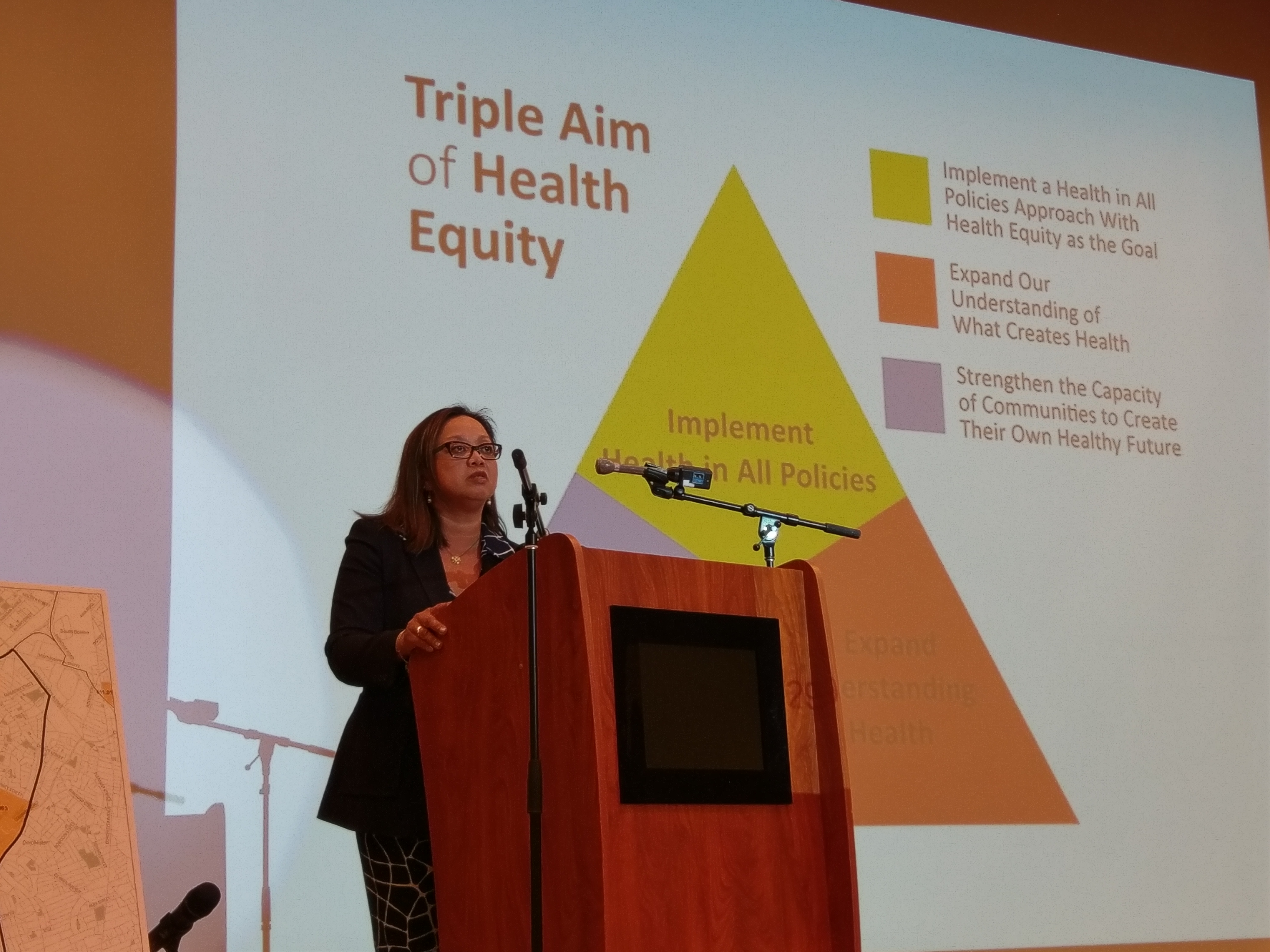BPHC Director Monica Valdes Lupi
Residents of Roxbury, especially those living in subsidized housing, face greater health risks, including higher rates of asthma, diabetes and elevated blood lead levels, than many other Boston residents. These increased risks, according to the Boston Public health Commission, are linked to the quality and availability of housing in Boston.
The connection between health and fair housing was discussed at a forum held on Tuesday, April 25, at Hibernian Hall in Dudley Square.
BPHC executive director Monica Valdes Lupi described an upcoming study about how housing impacts health, which showed the intersection between race, poverty and health. While Valdes Lupi acknowledged that Boston tops many laudable lists—best tasting tap water, best access to healthcare, most walkable city—Boston also suffers from issues of economic inequality, highlighted by topping the Brookings Institution’s list of most unequal cities.
“Nearly a third of [Boston] residents live in poverty and one in five of our kids live in poverty, and we know that this burden is not borne out equally,” she said. “And poverty, like other social determinants… impact not only one’s health but a community’s overall health.”
Adults who live in Boston Housing Authority units or receive Section 8 are twice as likely to suffer from asthma and diabetes than the city-wide average. Roxbury residents also face slightly higher rates of elevated blood lead levels. Additionally, black and Latino Bostonians, many of whom reside in Roxbury, are more likely to suffer from asthma than white residents.
Past studies have indicated health disparities between the rich and poor in Boston. A 2013 BPHC study found that Back Bay residents have a life expectancy of 83.7 years, while Roxbury residents have an average expectancy of 74. A study by Virginia Commonwealth University found a gap as big as 33 years between these communities.
Life expectancy wasn’t discussed at the Roxbury meeting,but according to Ana Vivas of BPHC the topic will be explored at future meetings.
There are several initiatives underway to improve the health of affected communities. Lead Safe Boston, a partnership with the Department of Neighborhood Development, de-leads older apartments, especially those that house young children who are particularly vulnerable to the effects of lead poisoning. BPHC later told Spare Change News that it provides funds for eligible homeowners and landlords with funding to help out with such services. Additionally, 50,000 affordable housing units have been converted into smoke-free housing. BPHC and BHA also assist pregnant women find safe, stable, healthy housing though the Healthy Start in Housing program.
Of course, the discussion wasn’t just about health risks, but the issues of housing displacement, affordability and housing discrimination.
“Those of us who do civil rights work and fair housing work have seen a tremendous amount of displacement due to domestic violence, predatory lending, foreclosures, institutional expansion and the biggest wave of gentrification in our city’s history financed by capital from all over the world,” said Bob Terrell, executive director of Fair Housing Center of Greater Boston. “If we don’t get this housing crisis figured out properly, we will see the resegregation of our housing market and see years of civil rights efforts pushed to the side.”
The three most common forms of housing discrimination are based on handicap status, familial and residential status (like Section 8 vouchers) and race. Janine Anzalota, executive director of the Mayor’s Office of Fair Housing and Equity, also noted that from January to March 2017, the city has already investigated 10 cases of housing discrimination based on section 8 status.
Anzalota also told the audience that 64 new affordable units are coming to Roxbury by way of eight DND projects, and noted that the DND has created 287 affordable units over the course of 15 previous projects. However, such news is unlikely to ease the concerns of activists like Terrell, or the young activists who staged a sit-in at Boston Mayor Martin J. Walsh’s office back in March to demand more affordable housing.
The BPHC confirmed that more forums on health and housing will take place during the summer across Boston. No schedule is currently set.
BPHC will also release a study on the topic in May, containing much of the data discussed at this initial meeting.

Leave a Reply
You must be logged in to post a comment.